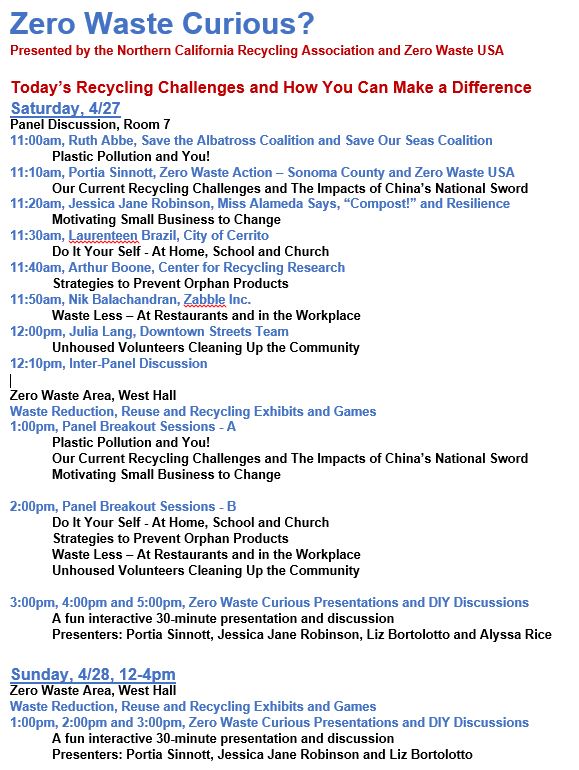By Liz Bortolotto, NCRA Communications Committee, 3/6/19
What’s the best way to reduce packaging waste? By getting rid of the package completely, of course! Ethical beauty brand, Lush, is doing just that. Thirty-five percent of their products are totally unpackaged, or as they like to say, naked.
 Lush is a privately-owned, British-based international company that makes brightly colored, fragrant creams, soaps, shampoos, shower gels, lotions, moisturizers, scrubs, masks and other cosmetics for the face, hair, and body. Lush is known for their “naked” solid shampoo bars, conditioners, henna hair colors, and massage bars. They also make a product called “Toothy Tabs” which are solid toothpaste tablets. These products save millions of plastic bottles from being produced, transported and disposed of every year. By providing customers with unpackaged options, they hope to increase awareness surrounding the overuse of disposable packaging and challenge other retailers to reduce their packaging too.
Lush is a privately-owned, British-based international company that makes brightly colored, fragrant creams, soaps, shampoos, shower gels, lotions, moisturizers, scrubs, masks and other cosmetics for the face, hair, and body. Lush is known for their “naked” solid shampoo bars, conditioners, henna hair colors, and massage bars. They also make a product called “Toothy Tabs” which are solid toothpaste tablets. These products save millions of plastic bottles from being produced, transported and disposed of every year. By providing customers with unpackaged options, they hope to increase awareness surrounding the overuse of disposable packaging and challenge other retailers to reduce their packaging too.
 Additionally, several years ago they stopped offering traditional gift wrapping in favor of reusable fabric “knot-wraps”. These are either made from a material created from recycled plastic bottles, or from organic cotton. Rather than being thrown away after opening, they can be reused again and again for gift wrapping, decorating or as an accessory. Looking for a good packing solution, they originally used popcorn. However, they wound up replacing popcorn with packing peanuts made from starch and water that use less energy to produce than popcorn and are completely compostable.
Additionally, several years ago they stopped offering traditional gift wrapping in favor of reusable fabric “knot-wraps”. These are either made from a material created from recycled plastic bottles, or from organic cotton. Rather than being thrown away after opening, they can be reused again and again for gift wrapping, decorating or as an accessory. Looking for a good packing solution, they originally used popcorn. However, they wound up replacing popcorn with packing peanuts made from starch and water that use less energy to produce than popcorn and are completely compostable.
Lush marks its trademark black tub products with stickers of the actual creators of the product being sold, a unique trademark placed on their recyclable polypropylene plastic black pots. The company also offers customers a way to recycle used black pots by bringing empty ones back to the store for a free Fresh Face Mask for every five pots returned.
Founders Mark Constantine, an herbal trichologist, and Elizabeth Weir who had an interest in beauty therapy, originally formed a company named Constantine & Weir in the early 1980s. Some of their products were sold in the Body Shop. They branched from suppliers to the Body Shop to an online business that became “Lush” in 1995. Lush is now sold in 50 countries with over 900 shops. Lush North American has gone from a single shop in Vancouver to nearly 240 shops across Canada and the U.S.
Lush promotes several other causes which are reflected in their business practices. They support regenerative agriculture projects in places like Uganda, Peru, Guatemala and Arizona. They try to source all their ingredients ethically paying attention to the labor practices of the areas they source product and encouraging sustainable practices.
Lush has been publically against animal testing for decades. For a long time, their efforts were focused on their own internal policies to avoid animal testing. However, in 2012 they decided to create the Lush Prize. Awarded annually, the £250,000 Lush Prize focuses on safety testing for consumer products and complements projects that address alternatives to animal testing for medicines. They award prizes across five areas: Science, Training, Lobbying, Public Awareness and Young Researchers. This prize is a way for Lush to join a global conversation about animal testing and give passionate researchers and activists the opportunity to showcase and continue their work.
You can read more about Lush products, solutions, and stories on their website at www.lushusa.com
# # #



